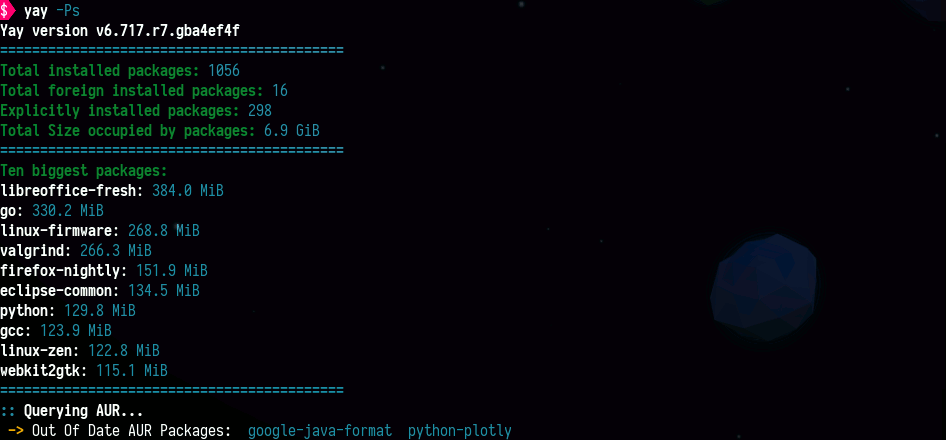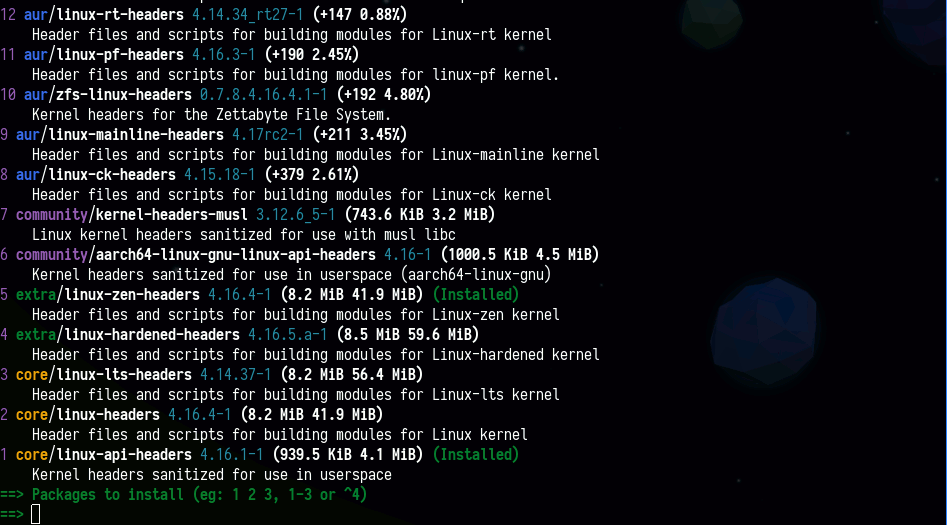| .go | ||
| completions | ||
| doc | ||
| testdata | ||
| vendor | ||
| .gitignore | ||
| callbacks.go | ||
| clean.go | ||
| cmd.go | ||
| completions.go | ||
| config_test.go | ||
| config.go | ||
| dep.go | ||
| depCheck.go | ||
| depSolver.go | ||
| download.go | ||
| exec.go | ||
| go.mod | ||
| go.sum | ||
| install.go | ||
| ISSUE_TEMPLATE.md | ||
| keys_test.go | ||
| keys.go | ||
| LICENSE | ||
| main.go | ||
| Makefile | ||
| parser_test.go | ||
| parser.go | ||
| print.go | ||
| query.go | ||
| README.md | ||
| upgrade_test.go | ||
| upgrade.go | ||
| utils.go | ||
| vcs_test.go | ||
| vcs.go | ||
Yay
Yet Another Yogurt - An AUR Helper Written in Go
Packages
Objectives
There's a point in everyone's life when you feel the need to write an AUR helper because there are only about 20 of them. So say hi to 20+1.
Yay is based on the design of yaourt, apacman and pacaur. It is developed with these objectives in mind:
- Provide an interface for pacman
- Yaourt-style interactive search/install
- Minimal dependencies
- Minimize user input
- Know when git packages are due for upgrades
Features
- Perform advanced dependency solving
- Download PKGBUILDs from ABS or AUR
- Tab-complete the AUR
- Query user up-front for all input (prior to starting builds)
- Narrow search terms (
yay linux headerwill first searchlinuxand then narrow onheader) - Find matching package providers during search and allow selection
- Remove make dependencies at the end of the build process
- Run without sourcing PKGBUILD
Installation
If you are migrating from another AUR helper, you can simply install Yay with that helper.
Alternatively, the initial installation of Yay can be done by cloning the PKGBUILD and building with makepkg:
git clone https://aur.archlinux.org/yay.git
cd yay
makepkg -si
Support
All support related to Yay should be requested via GitHub issues. Since Yay is not officially supported by Arch Linux, support should not be sought out on the forums, AUR comments or other official channels.
A broken AUR package should be reported as a comment on the package's AUR page. A package may only be considered broken if it fails to build with makepkg. Reports should be made using makepkg and include the full output as well as any other relevant information. Never make reports using Yay or any other external tools.
Contributing
Contributors are always welcome!
If you plan to make any large changes or changes that may not be 100% agreed on, we suggest opening an issue detailing your ideas first.
Otherwise send us a pull request and we will be happy to review it.
Dependencies
Yay depends on:
- go (make only)
- git
- base-devel
Note: Yay also depends on a few other projects (as vendored dependencies). These
projects are stored in vendor/, are built into yay at build time, and do not
need to be installed separately. These files are managed by
dep and should not be modified manually.
Following are the dependencies managed under dep:
- https://github.com/Jguer/go-alpm
- https://github.com/Morganamilo/go-srcinfo
- https://github.com/Morganamilo/go-pacmanconf
- https://github.com/mikkeloscar/aur
Building
Run make to build Yay. This command will generate a binary called yay in
the same directory as the Makefile.
Note: Yay's Makefile sources its dependencies from vendor/. When
building manually, dependencies will instead be sourced from GOPATH. To
build against vendor/ you must specify -mod=vendor in the build command.
Code Style
All code should be formatted through go fmt. This tool will automatically
format code for you. We recommend, however, that you write code in the proper
style and use go fmt only to catch mistakes.
Testing
Run make test to test Yay. This command will verify that the code is
formatted correctly, run the code through go vet, and run unit tests.
Frequently Asked Questions
Yay does not display colored output. How do I fix it?
Make sure you have the Color option in your /etc/pacman.conf
(see issue #123).
Yay is not prompting to skip packages during system upgrade.
The default behavior was changed after
v8.918
(see 3bdb534
and issue #554).
To restore the package-skip behavior use --combinedupgrade (make
it permanent by appending --save). Note: skipping packages will leave your
system in a
partially-upgraded state.
Sometimes diffs are printed to the terminal, and other times they are paged via less. How do I fix this?
Yay uses git diff to display diffs, which by default tells less not to
page if the output can fit into one terminal length. This behavior can be
overridden by exporting your own flags (export LESS=SRX).
Yay is not asking me to edit PKGBUILDS, and I don't like the diff menu! What can I do?
yay --editmenu --nodiffmenu --save
How can I tell Yay to act only on AUR packages, or only on repo packages?
yay -{OPERATION} --aur
yay -{OPERATION} --repo
An Out Of Date AUR Packages message is displayed. Why doesn't Yay update them?
This message does not mean that updated AUR packages are available. It means
the packages have been flagged out of date on the AUR, but
their maintainers have not yet updated the PKGBUILDs
(see outdated AUR packages).
Yay doesn't install dependencies added to a PKGBUILD during installation.
Yay resolves all dependencies ahead of time. You are free to edit the PKGBUILD in any way, but any problems you cause are your own and should not be reported unless they can be reproduced with the original PKGBUILD.
I know my -git package has updates but yay doesn't offer to update it
Yay uses an hash cache for development packages. Normally it is updated at the end of the package install with the message Found git repo.
If you transition between aur helpers and did not install the devel package using yay at some point, it is possible it never got added to the cache. yay -Y --gendb will fix the current version of every devel package and start checking from there.
Examples of Custom Operations
yay <Search Term>
Present package-installation selection menu.
yay -Ps
Print system statistics.
yay -Yc
Clean unneeded dependencies.
yay -G <AUR Package>
Download PKGBUILD from ABS or AUR.
yay -Y --gendb
Generate development package database used for devel update.
yay -Syu --devel --timeupdate
Perform system upgrade, but also check for development package updates and use
PKGBUILD modification time (not version number) to determine update.
Images






